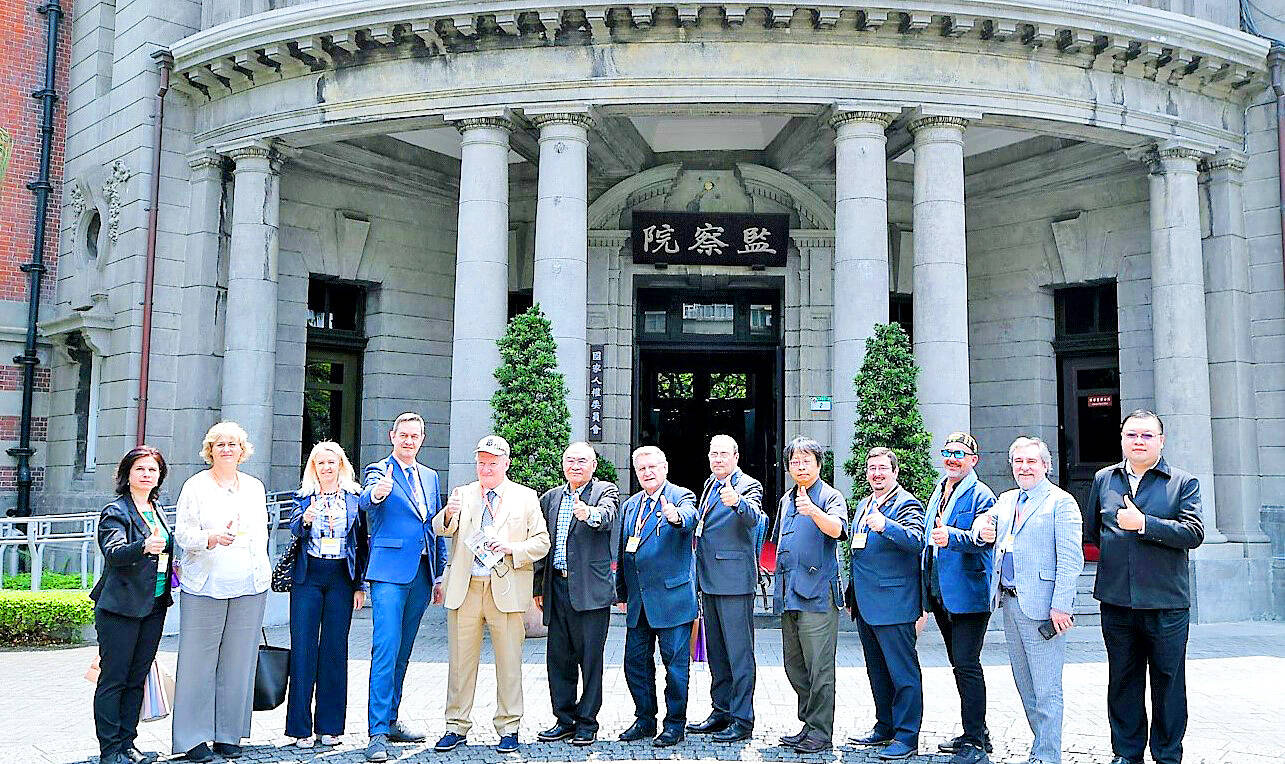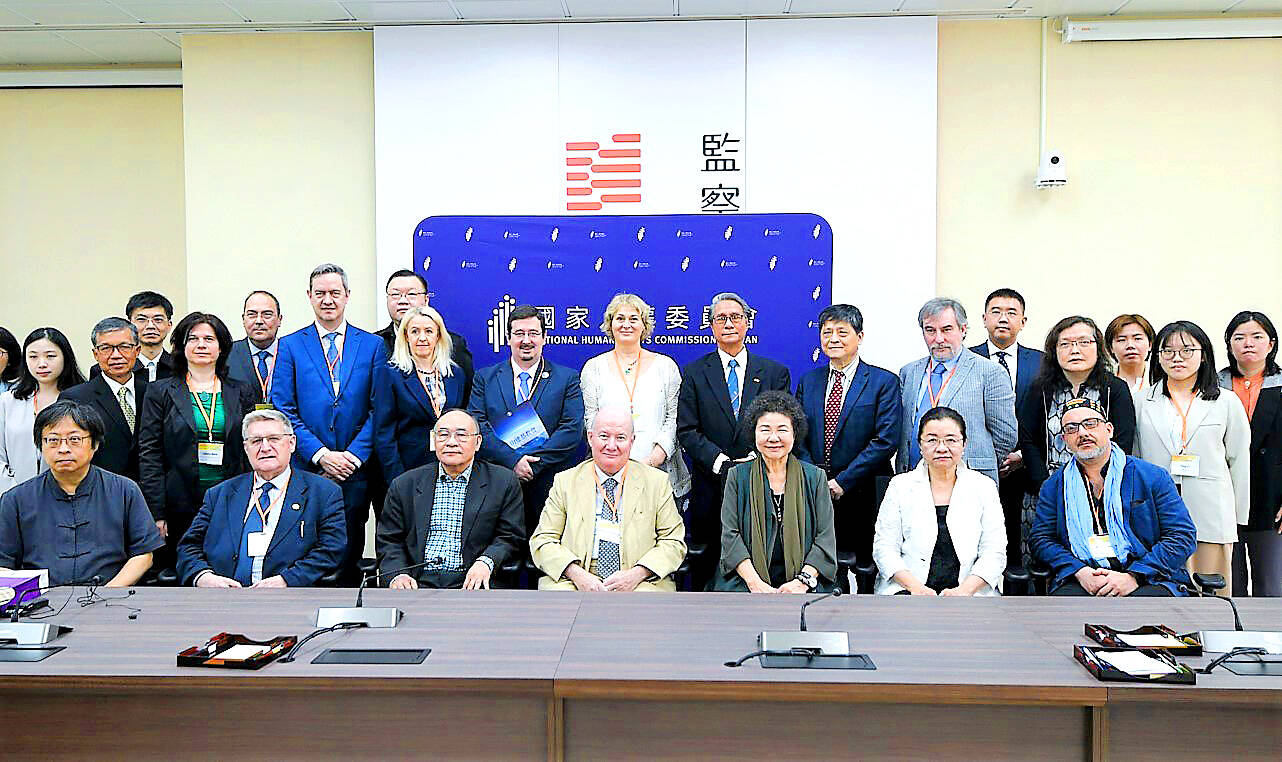In the middle of last month, an international human rights investigation group consisting of human rights academics and experts, media editors and reporters from Austria, Belgium, France, Italy, Lithuania, Spain, Romania and the US visited Taiwan and met with government agencies and human rights organizations.
The group’s final visit was to the Control Yuan’s National Human Rights Commission in Taipei, where they met with Control Yuan President Chen Chu (陳菊) and commission members Tien Chiu-chin (田秋堇) and Lai Chen-chang (賴振昌) to discuss issues related to transitional justice, post-authoritarian human rights persecution cases and the commission’s duties.
The group previously visited the National Human Rights Museum in New Taipei City — the former site of a prison in which more than 8,000 political prisoners were held and tried in military courts during the Martial Law period, including Chen.

Photo: Taipei Times
Citizen Congress Watch board member Tseng Chien-yuan (曾建元), who accompanied the group, said: “These academics have seen the prison cell in which Chen Chu was being held at the time. She was an inmate at the time, and she is now the president of the Control Yuan. In addition to admiring her courage at the time, we also believe that her experiences and abilities can prevent Taiwan from repeating her experiences, and bring progress in all aspects of Taiwan’s human rights.”
Led by Italian sociologist Massimo Introvigne, who is editor-in-chief of religious magazine Bitter Winter and a world-renowned academic, and Willy Fautre, president of the Belgium-based non-governmental group Human Rights Without Frontiers, the delegation said Taiwan’s most valuable assets are freedom, democracy and human rights.
The delegation also focused on human rights abuse cases that have not yet been fully redressed in Taiwan’s post-authoritarian era, including a case involving the previously persecuted Tai Ji Men Qigong group, which urgently requires the implementation of transitional justice and obtaining redress.

Photo: Taipei Times
The group was accompanied to the National Human Rights Commission by Ambassador-at-Large for Religious Freedom Pusin Tali, who was appointed after the administration of President Tsai Ing-wen (蔡英文) created the position.
Pusin Tali is a pastor in the Presbyterian Church and has experienced first-hand the political oppression that the church has undergone.
Upon hearing about the international attention surrounding the Tai Ji Men case, including from the delegation, he made an appeal.
“The international community is supporting Tai Ji Men. While waiting for legislative reforms, the most important thing is to allow them to use their land and academies properly,” he said. “This will help them cultivate their minds and spirits. Religion is about bringing out the good side of people. Our country should make good use of Tai Ji Men and use it as a form of international diplomacy.”
The delegation’s visit was organized by the Taiwan-based Chinese Democracy Academy Association and Citizen Congress Watch.
The organizers said they made special arrangements to help the international experts experience the democratic values of Taiwan more deeply.
“The National Human Rights Commission has been operating for two to three years, but it still lacks the power of judicial review,” Tseng said. “The power of judicial review is to provide it with a weapon, for example, temporary injunctive relief for cases where human rights are being infringed upon. It should be able to suspend the execution of illegal or inappropriate administrative penalties.”
Chen expressed her willingness to make the greatest effort possible to achieve this.
Introvigne said that through the group members’ meetings and exchanges in Taiwan over the past few days, they hoped to observe and experience the diversity and prosperity of religions in Taiwan.
While praising Taiwan’s efforts and attitude toward religious freedom, they nevertheless also had to bring up the unresolved issue of Tai Ji Men as a matter of religious freedom, Introvigne said.
“Many international scholars, including those in the United States, are concerned about this issue,” he said.
Introvigne said he believes that as a highly democratic country, Taiwan’s only way to solve such problems is through dialogue.
He emphasized that they are good friends and defenders of Taiwan and are willing to help wherever they can.

Chinese Nationalist Party (KMT) Chairman Eric Chu (朱立倫), spokeswoman Yang Chih-yu (楊智伃) and Legislator Hsieh Lung-chieh (謝龍介) would be summoned by police for questioning for leading an illegal assembly on Thursday evening last week, Minister of the Interior Liu Shyh-fang (劉世芳) said today. The three KMT officials led an assembly outside the Taipei City Prosecutors’ Office, a restricted area where public assembly is not allowed, protesting the questioning of several KMT staff and searches of KMT headquarters and offices in a recall petition forgery case. Chu, Yang and Hsieh are all suspected of contravening the Assembly and Parade Act (集會遊行法) by holding

PRAISE: Japanese visitor Takashi Kubota said the Taiwanese temple architecture images showcased in the AI Art Gallery were the most impressive displays he saw Taiwan does not have an official pavilion at the World Expo in Osaka, Japan, because of its diplomatic predicament, but the government-backed Tech World pavilion is drawing interest with its unique recreations of works by Taiwanese artists. The pavilion features an artificial intelligence (AI)-based art gallery showcasing works of famous Taiwanese artists from the Japanese colonial period using innovative technologies. Among its main simulated displays are Eastern gouache paintings by Chen Chin (陳進), Lin Yu-shan (林玉山) and Kuo Hsueh-hu (郭雪湖), who were the three young Taiwanese painters selected for the East Asian Painting exhibition in 1927. Gouache is a water-based

Taiwan would welcome the return of Honduras as a diplomatic ally if its next president decides to make such a move, Minister of Foreign Affairs Lin Chia-lung (林佳龍) said yesterday. “Of course, we would welcome Honduras if they want to restore diplomatic ties with Taiwan after their elections,” Lin said at a meeting of the legislature’s Foreign Affairs and National Defense Committee, when asked to comment on statements made by two of the three Honduran presidential candidates during the presidential campaign in the Central American country. Taiwan is paying close attention to the region as a whole in the wake of a

OFF-TARGET: More than 30,000 participants were expected to take part in the Games next month, but only 6,550 foreign and 19,400 Taiwanese athletes have registered Taipei city councilors yesterday blasted the organizers of next month’s World Masters Games over sudden timetable and venue changes, which they said have caused thousands of participants to back out of the international sporting event, among other organizational issues. They also cited visa delays and political interference by China as reasons many foreign athletes are requesting refunds for the event, to be held from May 17 to 30. Jointly organized by the Taipei and New Taipei City governments, the games have been rocked by numerous controversies since preparations began in 2020. Taipei City Councilor Lin Yen-feng (林延鳳) said yesterday that new measures by